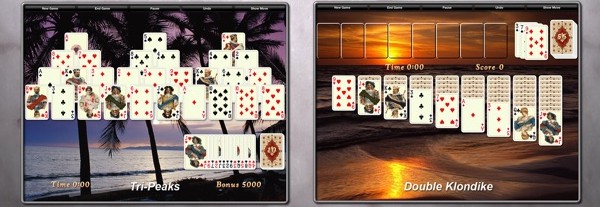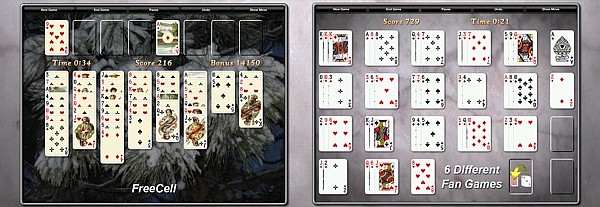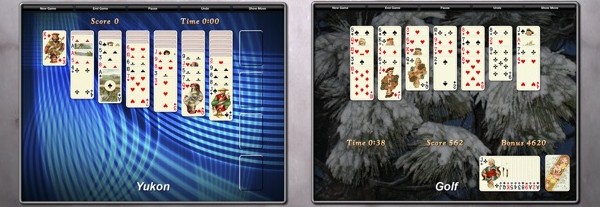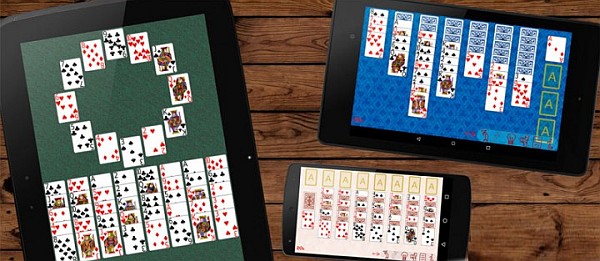Playing cards really started blossoming more than six centuries ago, after arriving in Western Europe in the late 1300s. So what was the huge catalyst that was key to spread throughout Europe and eventually around the world? Card games. Solitaire card games, however, only began making a lasting mark after experiencing a boom in development some two hundred years ago in France.
Two centuries is still plenty of time for solitaire card games to become entrenched into playing card culture. But despite this long history, the solitaire card game really only came into its own with the birth of the personal computer, and when these began to enter workplaces and homes in the 1980s and early 1990s. The arrival of Windows 3.0 in the year 1990 brought with it Klondike Solitaire, and in a short space of time, this digital diversion became a staple activity for bored office-workers and for billions of others around the globe.
So it really is the digital revolution that has fuelled the success of the solitaire card game and helped bring it to the modern audience, giving it the enormous popularity it enjoys today. So what are some of the reasons for this enormous success? And why should you explore playing Solitaire card games with the help of software? Before we take a look at some of the best digital resources available for playing solitaire (in another article), here’s an overview of some of the advantages of playing solitaire on your personal computer or portable device.

12 Great Reasons to Use a PC, Tablet, or Phone for Playing Solitaire
1. It eliminates the hassles of handling cards.
Solitaire card games are great fun, but there can be a lot of practical challenges associated with playing them if you’re using a physical deck, simply in view of the extensive handling of the cards necessary to play them. You need to shuffle the deck, or sometimes two decks, often multiple times. Then you need to deal out lots of cards. During the game you typically need to move large stacks of cards from one place to another, all the while keeping the cards carefully in order. It is all perfectly doable, but a digital version removes all the headaches of this administrative book-keeping, and allows you to focus on enjoying the game itself. While solitaire games that involve a large amount of manipulation of the cards are a pain to play in real life, they are a breeze to play in a computer version.
2. It enforces the rules.
Software manages all aspects of the game for you, and as a result you don’t have to worry about making an illegal move. An accidental rules error might completely invalidate your whole game, or perhaps turns a potentially winning hand into one that proves impossible. For example, it is easy to forget how many times you’ve cycled through a deck, and so you could easily make the mistake of doing this once too often, or perhaps erring on the other side by accidentally stopping short of the final deal. A digital version will take care of this for you, ensuring that you won’t make game-killing mistakes like these.
3. It makes games easier to learn.
This follows from the previous point, because if the software takes care of enforcing the rules for you, it also makes it a whole lot easier to learn the rules of a new game; you can simply count on the computer taking care of most things for you. If you’re not sure what to do, just start clicking and trying to move cards around, and you’ll quickly discover what moves are permitted and what ones are not. In my youth I tried learning solitaire games numerous times, and had to rely exclusively on printed descriptions in books. It was very challenging, and I often gave up. In contrast, learning a new solitaire game on a computer is a piece of cake.
4. It makes games quicker to play.
With less handling to worry about, along with automatic rule enforcement and scoring, combined with the absence of set-up and space requirements, you can jump into a game without any preparation, and zip through an entire game in as little as a minute, or perhaps five minutes, depending on what you are playing. Playing the same game firsthand would require a significantly larger investment of effort and time. And if you’re the kind of person that likes to use the optional features of some programs which highlight the cards that are legal moves, you can play even more speedily.
5. It makes games easy to customize.
The best solitaire games software will give you options for each different solitaire game, so that you can play with the variations or house rules that you prefer or that you are used to. Some programs even take this a step further, allowing you to customize individual games entirely, and effectively build your own solitaire game, tinkering with the rules in ways that are immediately applied to your next game.
6. It eliminates set-up and space requirements.
Unlike a physical game, you don’t need to set up a large tableau, or require a large working area like a kitchen table. You simply fire up your app or computer program, and within 5 seconds you can be playing your favourite solitaire game. This makes the thresh-hold for entry much lower, and makes solitaire games a whole lot more accessible.

7. It gives you easy access to many different games.
Most decent solitaire programs offer a good choice of solitaire games as part of their package. Often these are well organized by types, making it easy to find solitaire games that suit your own preferences, or to try games that are similar to ones that you already like. The range of solitaire games is enormous, and it is easy to build in a large number of these within a digital version. Most apps and programs will typically also allow you to create and maintain a running list of your favourites, to make these easy to find.
8. It makes it easy to find similar games.
Found a particular solitaire game that you really like? Many software programs have features that let you group games by categories or families. This lets you easily find a similar game that is related to the one you already enjoy, or plays somewhat like it. And as mentioned already, being able to “favourite” your preferred games enables you to quickly return to them in the future.
9. It adds visual beauty.
It is hard to argue with the visual aesthetics of a physical printed deck, and the tactile feel of actual cards. A digital version can never substitute that on a screen. But it can add elements that are just not possible with a physical deck. With the click of a mouse, you can change the whole look of your game in remarkable ways. Most good programs will have extensive options for customizing your graphics, so that you can play with different decks of cards, and enjoy varying graphic designs and artwork, including different card backs and background artwork. Personally I love tinkering with these, and I occasionally play with different looking decks, just to mix things up and change the experience of a favourite game that I’m playing for the umpteenth time.
10. It lets you undo moves.
An “undo” button comes standard with most solitaire software, and what it lets you do is track back large sets of moves, and explore different paths and options. This means that if you arrive at a dead end or make a mistake, you have a fool-proof way of retracing your steps, and trying another pathway. Making games fully trackable helps turn some games that would otherwise be frustrating and impossible into fun, because now you can safely back-track and explore another path. Is an “undo” considered cheating? Not necessarily. In many cases you can turn this option off or on, so if you really feel strongly about this, you can always disable this feature.
11. It tracks your statistics.
It can be fascinating to see what your win percentage is for a particular game, and be able to access a precise record of how many games you’ve won and lost. Software implements these kinds of things automatically and easily. Being able to compare your stats with other players gives you even more ways to challenge yourself. I especially like the option to track your time, and programs which record your personal bests. Some programs come with built-in “high score” charts for every individual game or variation, and this gives you additional incentives to return to a game.
12. It gives other special features.
With technology, all kinds of possibilities can be explored, and some software developers have come up with some very creative and useful ideas that can help make your solitaire playing experience even better. Besides the above-mentioned features like “undo” and statistics, other examples of special features you can find in some programs include the ability to save games, mark available moves, achievements, challenges, and more.

Final Thoughts
While playing a digital version of Solitaire can never substitute for the tactile feel of holding actual cards in your hands, it does offer many real advantages above playing with a physical deck. So it is no real surprise that digital implementations of Solitaire are a big reason why so many people are familiar with Solitaire today.
Microsoft in particular deserves a lot of credit for popularizing solitaire card games via the digital versions that entered our homes via their Windows operating systems. Granted, Microsoft wasn’t the first to digitize solitaire card games and they wouldn’t be the last. Ever since the PC arrived, programmers with an interest in card games saw the potential for using these new devices in exciting new ways for playing solitaire, and were already creating versions of their favourites. But it was Microsoft that really brought these to the everyday user, and made them familiar on a global level, turning them into bread-and-butter time-killers.
This wide reach meant that digital games of Solitaire would appeal to a very wide cross-section of people, and this enabled other creators to expend effort and resources into developing impressive software platforms for playing even more versions of Solitaire. The arrival of the handheld digital device has only opened up more possibilities, along with the ability to play via web browsers.
So what are you waiting for? Check out some websites, apps, or other software, and discover what millions of people around the world have been enjoying for over 30 years – but now with the benefit of terrific implementations that have features and possibilities like never before! And just maybe playing solitaire on your PC, phone, or mobile device, might encourage you to pull out an actual deck of cards for a game or two as well!

About the writer: EndersGame is a well-known reviewer of board games and playing cards. He loves card games, card magic, and collecting playing cards. This article first appeared on PlayingCardDecks.com here.
